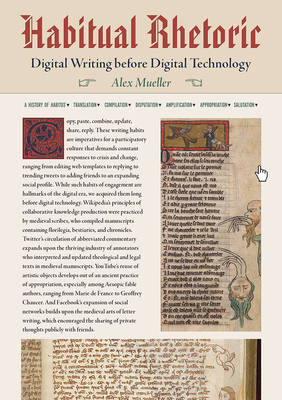
Door een staking bij bpost kan je online bestelling op dit moment iets langer onderweg zijn dan voorzien. Dringend iets nodig? Onze winkels ontvangen jou met open armen!
- Afhalen na 1 uur in een winkel met voorraad
- Gratis thuislevering in België vanaf € 30
- Ruim aanbod met 7 miljoen producten
Door een staking bij bpost kan je online bestelling op dit moment iets langer onderweg zijn dan voorzien. Dringend iets nodig? Onze winkels ontvangen jou met open armen!
- Afhalen na 1 uur in een winkel met voorraad
- Gratis thuislevering in België vanaf € 30
- Ruim aanbod met 7 miljoen producten
Zoeken
Omschrijving
Writing has always been digital. Just as digits scribble with the quill or tap the typewriter, digits compose binary code and produce text on a screen. Over time, however, digital writing has come to be defined by numbers and chips, not fingers and parchment. We therefore assume that digital writing began with the invention of the computer and created new writing habits, such as copying, pasting, and sharing. Habitual Rhetoric: Digital Writing before Digital Technology makes the counterargument that these digital writing practices were established by the handwritten cultures of early medieval universities, which codified rhetorical habits--from translation to compilation to disputation to amplification to appropriation to salutation--through repetitive classroom practices and within annotatable manuscript environments. These embodied habits have persisted across time and space to develop durable dispositions, or habitus, which have the potential to challenge computational cultures of disinformation and surveillance that pervade the social media of today.
Specificaties
Betrokkenen
- Auteur(s):
- Uitgeverij:
Inhoud
- Aantal bladzijden:
- 320
- Taal:
- Engels
- Reeks:
Eigenschappen
- Productcode (EAN):
- 9780822947837
- Verschijningsdatum:
- 19/09/2023
- Uitvoering:
- Hardcover
- Formaat:
- Genaaid
- Afmetingen:
- 150 mm x 218 mm
- Gewicht:
- 589 g

Alleen bij Standaard Boekhandel
+ 183 punten op je klantenkaart van Standaard Boekhandel
Beoordelingen
We publiceren alleen reviews die voldoen aan de voorwaarden voor reviews. Bekijk onze voorwaarden voor reviews.











